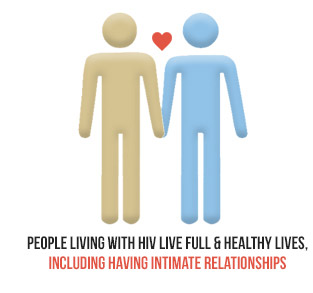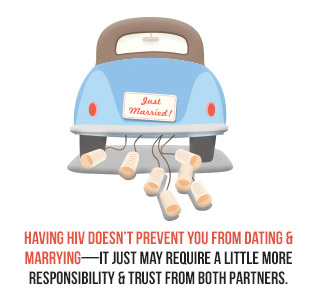Dating and Marriage
If you are living with HIV, you may be wondering whether you can ever date or get married. The answer is: “Yes!”
It’s true that the issue of having a sexual relationship with a partner can cause anxiety when you are living with HIV. But you have to remember—“living with HIV” means just that: Living! Having HIV does not prevent you from dating or marrying—it just may require a little more responsibility and trust from you and your partner.
When Should You Tell Someone You Have HIV?
Disclosing your HIV-positive status to a potential intimate partner may be one of the most personal and stressful situations you will face. But when that information is shared, you and your partner can both make informed choices about safer sex, including using condoms and medicines that prevent and treat HIV.
There is no “right” way to disclose, but here are some tips that can help you:
- Don’t wait until the heat of the moment to start talking about HIV. It’s better to talk about it earlier than later—certainly before you have sex.
- Some people living with HIV have suggested that it helps to talk about your status earlier in the relationship than later. Disclosing you are HIV-positive after you’ve become close to someone can cause your partner to feel as though you have kept something important from him or her.
- Don’t force it. Find the right time and place to have a conversation. You can schedule a time to talk or have spontaneous conversations in a setting where you are comfortable.
- Try scheduling regular check-ins or “talkiversaries.” The key to having a healthy relationship is having an open dialogue throughout the relationship. It can be hard to find the right time to bring these things up. If you agree to schedule them in advance, no one has to wonder about the timing of the conversations.
- A conversation does not have to be face-to-face. Whether you talk, type, or text, what is important is that you start the conversation about HIV.
Need more? The CDC’s Start Talking. Stop HIV. campaign has information and resources as well as practical tips for starting conversations about safe sex and HIV.
Also, it’s important to keep in mind that many states have laws that require you to tell your sexual partners if you are HIV-positive before you have sex (anal, vaginal, or oral). In some states, you can be charged with a crime if you don’t tell your partner your HIV status, even if your partner doesn’t become infected. Learn more about state HIV-specific criminal laws.
In addition, to promote safe and voluntary HIV disclosure and address the barriers that may prevent some people living with HIV from disclosing their status, the President’s Advisory Council on HIV/AIDS (PACHA) and the CDC/HRSA Advisory Committee on HIV, Viral Hepatitis and STD Prevention and Care (CHAC) have issued Joint Recommendations on Safe and Voluntary Disclosure of HIV in the United States.
Serosorting
Some people living with HIV choose to practice “serosorting”—having sex only with partners of the same HIV status, often to engage in unprotected sex, in order to reduce the risk of transmitting the virus to an HIV-negative person. However, the CDC does not recommend serosorting as a safer sex practice. Among the reasons it is not recommended is that serosorting does not protect against other sexually transmitted infections (STIs), such as hepatitis B virus (HBV), hepatitis C virus (HCV), syphilis, and herpes. There is also the risk of HIV re-infection (infection with another strain of HIV), which can result in harder-to-treat HIV superinfection.
For more information, see CDC’s page on Serosorting among Gay, Bisexual, and Other Men Who Have Sex with Men.
Keep Yourself and Your Partner Healthy
If you are living with HIV and your partner is HIV-negative, here are steps you can take to reduce the risk of transmitting HIV from you to him or her:
- Use antiretroviral therapy (ART). ART reduces the amount of virus in your blood and body fluids. ART can keep you healthy for many years, and greatly reduce your chance of transmitting HIV to your sexual partner(s) if you take it consistently and correctly.
- If you are taking ART, follow your healthcare provider’s advice. Visit your provider regularly and always take your medicine as directed.
- Use condoms consistently and correctly. When used correctly and consistently, condoms are highly effective in preventing HIV infection, as well as other sexually transmitted diseases (STDs). Both male and female condoms are available. For more information on condom use, see CDC’s HIV Basics: Prevention.
- Choose less risky sexual behaviors. Oral sex is much less risky than anal or vaginal sex. Anal sex is the highest-risk sexual activity for HIV transmission. During anal sex, it is less risky for you as the HIV-positive partner to be the receptive partner (bottom) than the insertive partner (top). Sexual activities that do not involve the potential exchange of bodily fluids carry no risk for getting HIV (e.g., touching). For more information on proper condom usage and other ways to reduce the risk of transmitting HIV through sexual contact, see our page on Sexual Risk Factors.
- Talk to your partner about pre-exposure prophylaxis (PrEP). PrEP is a way for people who don’t have HIV to prevent HIV infection by taking a pill every day. The pill contains two medicines that are also used to treat HIV. Along with other prevention methods like condoms, PrEP can offer good protection against HIV if taken every day. CDC recommends PrEP be considered for people who are HIV-negative and at substantial risk for HIV infection. This includes HIV-negative individuals who are in an ongoing relationship with an HIV-infected partner. For more information, see our page on PrEP.
- Talk to your partner about post-exposure prophylaxis (PEP) if you think they have had a possible exposure to HIV. An example of a possible exposure is if you have anal or vaginal sex without a condom or the condom breaks and your partner is not on PrEP. Your partner’s chance of exposure to HIV is lower if you are taking ART consistently and correctly, especially if your viral load is undetectable. Your partner should talk to his/her doctor right away (within 3 days) if they think they have had a possible exposure to HIV. Starting medicine immediately (known as post-exposure prophylaxis, or PEP) and taking it daily for 4 weeks reduces your partner’s chance of getting HIV. For more information, see our page on PEP.
- Get tested and treated for STDs and encourage your partner to do the same. If you are sexually active, get tested at least once a year. STDs can have long-term health consequences. If you are living with HIV, STDs can also increase your risk of transmitting it to others. You should also encourage your partner to get tested for HIV at least once a year so they are sure about their HIV status and can take action to keep them healthy. They may benefit from more frequent testing (e.g., every 3-6 months). Use the AIDS.gov HIV Testing and Care Services Locator to find a testing site near you.
Related Topics on AIDS.gov
Frequently Asked Questions
Can a heterosexual mixed-status couple conceive a baby without passing the virus to the uninfected partner or the baby?
Mixed-status couples can have healthy children, but it's important to talk to a healthcare provider about what you can do to lower the risk of passing HIV to the uninfected partner or the baby. PrEP is one of several options to protect the uninfected partner during conception and pregnancy, and there are also ways to get pregnant without having unprotected sex. The risks of transmitting HIV are different for men and women, and your provider can give you information to help you conceive safely. For more information, see our Pregnancy and Childbirth page.
If I have an undetectable viral load, can I still transmit HIV to my partner?
Yes. Having an undetectable viral load greatly lowers your chance of transmitting the virus to your sexual partners who are HIV-negative. However, even if you have an undetectable viral load, you still have HIV in your body, which means there is still a chance that you could potentially infect a partner. Taking other actions, like using a condom consistently and correctly, can lower your chances of transmitting HIV even more.
Additional Resources
Last revised: 08/13/2014



